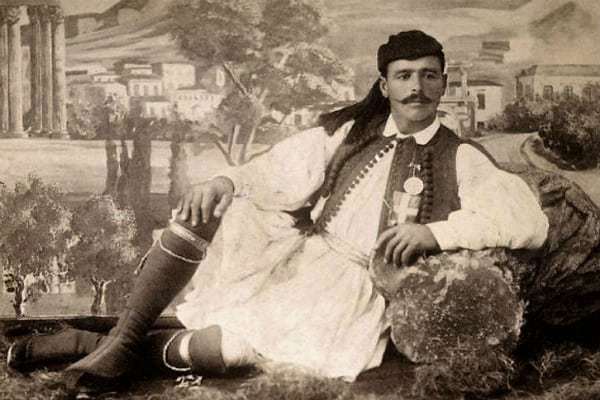Spyros Louis was born on January 12, 1873, in Marousi, Attica (a northeastern suburb in Athens), to a very poor peasant family. His father was a water carrier and young Spyros helped him carry water from a very young age. He would cover great distances on a daily basis carrying jugs of water on his shoulders. During his military service he was distinguished for his incredible stamina and athleticism, which surprised his superiors. According to several historical sources, Louis once ran from downtown Athens to Marousi and back, a distance of 8.8 miles (14.1 kilometers) each way, to retrieve his peaked cap, which he had forgotten at home, in less time than carriages covered the same distance back then.
Due to his astonishing athletic achievements, Spyros Louis was the only one of seventeen men taking part in the first Olympic marathon (run on April 10 in the first modern Olympics of 1896, in Athens) who wasn’t considered a competitive athlete. The man who convinced Louis to participate was an army colonel named Papadiamantopoulos; he knew about Louis’s rare athleticism and potential because he had been his commanding officer in the military, in which Louis had finished serving the previous year.

However, Louis didn’t perform that well at the qualifying race a few weeks before the Olympic Games and he only finished fifth mainly because of his inexperience in such events, but he was still able to take part in the Olympics since Greece was the host nation and could register more athletes than any other country, an Olympic tradition that is still valid today.
Despite the fact that the Greek athletes, who far outnumbered the competitors from the other 13 participating nations, had performed well and had won multiple medals so far at the Games, the local fans had been waiting for the marathon more than any other event probably because of the historical connection it had to the legendary story of the messenger Pheidippides, who ran from the town of Marathon to Athens to announce the Athenian victory in the Battle of Marathon.
Also, the fact that an American athlete named Robert Garrett won the gold medal in the discus throw, considered at the time the most revered of ancient Greek events, had been particularly painful for the Greek crowd and they were now looking for redemption through the marathon.

During the course of the race Louis showed remarkable confidence and lack of professionalism, to the point where some of the other competitors felt disrespected, but his amazing stamina and athleticism were the key factors in his victory. The heavy favorites before the race, Frenchman Albin Lermusiaux, who had already won bronze in the final of the 1500 meters and led for the better part of the marathon, and legendary Australian runner Edwin Flack, who had already won gold in the 800 and 1500 meters, both collapsed and couldn’t continue while the durable Louis prevailed.

